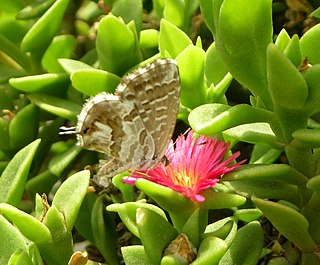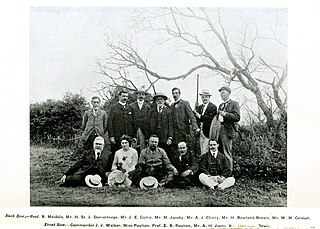
The superfamily Papilionoidea contains all the butterflies except for the moth-like Hedyloidea.

Lycaenidae is the second-largest family of butterflies, with over 6,000 species worldwide, whose members are also called gossamer-winged butterflies. They constitute about 30% of the known butterfly species.

Riodinidae is the family of metalmark butterflies. The common name "metalmarks" refers to the small, metallic-looking spots commonly found on their wings. The 1532 species are placed in 146 genera. Although mostly Neotropical in distribution, the family is also represented both in the Nearctic and the Palearctic.

The chalkhill blue is a butterfly in the family Lycaenidae. It is a small butterfly that can be found throughout the Palearctic realm, where it occurs primarily in grasslands rich in chalk. Males have a pale blue colour, while females are dark brown. Both have chequered fringes around their wings.

The geranium bronze or brun des pélargoniums in French, is a butterfly in the family Lycaenidae.

Lampides boeticus, the pea blue, or long-tailed blue, is a small butterfly that belongs to the lycaenids or gossamer-winged family.

Miletinae is a subfamily of the family Lycaenidae of butterflies, commonly called harvesters and woolly legs, and virtually unique among butterflies in having predatory larvae. Miletinae are entirely aphytophagous. The ecology of the Miletinae is little understood, but adults and larvae live in association with ants, and most known species feed on Hemiptera, though some, like Liphyra, feed on the ants themselves. The butterflies, ants, and hemipterans, in some cases, seem to have complex symbiotic relationships benefiting all.

Cacyreus is an Afrotropical genus of butterflies in the family Lycaenidae.

Leptotes pirithous, the Lang's short-tailed blue or common zebra blue, is a butterfly of the family Lycaenidae.

Cacyreus lingeus, the common bush blue or bush bronze, is a butterfly of the family Lycaenidae. As with other Cacyreus species it is endemic to the Afrotropics.

Cacyreus virilis, the eastern bush blue, mocker bronze or mocker blue, is a butterfly of the family Lycaenidae. It is found from South Africa to Zimbabwe, through central and eastern Africa to south-western Arabia.

Cacyreus tespis, the water bronze or water blue, is a butterfly of the family Lycaenidae. It is found from South Africa to Ethiopia.
Cacyreus dicksoni, the Dickson's geranium bronze, is a butterfly of the family Lycaenidae. It is found from South Africa, from the West Cape along the coast to the North Cape.

Hamilton Herbert Charles James Druce was an English entomologist who specialised in Lycaenidae and to a lesser extent Hesperiidae. He is not to be confused with his father, the English entomologist Herbert Druce (1846–1913) who also worked on Lepidoptera.
Cacyreus audeoudi, the Audeoud's blue or bright bush blue, is a butterfly in the family Lycaenidae. It is found in Guinea, Sierra Leone, Liberia, Ivory Coast, Ghana, Nigeria, Cameroon, the Republic of the Congo, the Democratic Republic of the Congo, Uganda, western Kenya, western Tanzania. The habitat consists of forests and forest-savanna areas.

Cacyreus darius is a butterfly in the family Lycaenidae. It is found on Madagascar, Mauritius, Réunion and the Comoros. The habitat consists of forests, forest margins and anthropogenic environments.
Cacyreus niebuhri is a butterfly in the family Lycaenidae. It is found in Yemen.













